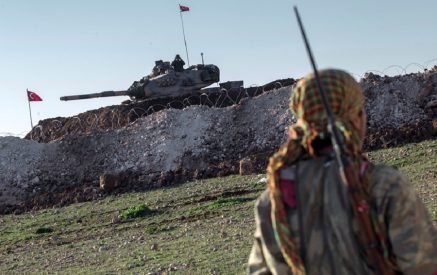One day after the official visit of the Minister of Foreign Affairs of Russia, Sergey Lavrov, the situation at the Armenia-Azerbaijan border moved to a new phase of tensions. In any case, that is what the information-misinformation flow from several officials and news outlets shows. In any case, the necessity of another phone call arose so that the “guarantor” Russian side could receive additional information about what is taking place via its channels in the Foreign Ministry and Defense Ministry.
What took place is what Prime Minister Nikol Pashinyan had announced at the Security Council session: on May 12th, Azerbaijani forces “crossed the state border of the Republic of Armenia in the Sev Lich area by 3.5 kilometers, and are essentially trying to enclose Sev Lich.” The Prime Minister evaluated the situation as being “at least close to a crisis, if not a crisis.”
And so, a group of armed bandits wearing the shoulder straps of a neighboring country hostile to a full-fledged member state of the CSTO infiltrated to a depth of 3.5 kilometers into what is essentially territory under the CSTO’s responsibility.
Naturally, it would be ridiculous to expect the CSTO to say anything bad about Azerbaijan. Perhaps it would not say anything bad, and that would be normal, right? Since “Russia is our ally, but Azerbaijan and Turkey are not its enemies.” Even more, Azerbaijan and Turkey are not the enemies of our other “allies” in the CSTO. Therefore, an abnormal reality was outlined long ago when we joined an alliance where we not only have no allies in our confrontation, but in fact have a “centuries-old friend” who can even take advantage of our confrontation and “save” us.
Read also
In any case, the Azerbaijani lawlessness at least chronologically followed Lavrov’s visit to Baku. In other words, the fact that the “guarantor” of the November 9th joint statement is not a “guarantor” in the issue of the Armenian POWs. This became clear much earlier, and the results of the Russian Foreign Minister’s visit only proved it even more. However, it turns out that Moscow has even lost its alarming influence on the Azerbaijani regime. In that case, what “guarantor” can we talk about? And in general, what are the supporters of the “deeper union with Russia” in Armenia raving about?
At the moment, after reading the statement from the Security Council session on May 12th, it seems more likely that the Russian side will consider this an issue of honor for itself so that it can “persuade” the Aliyev regime to return its own puppets using the means at its disposal, but there is no reason to consider the threat neutralized from a strategic point of view, and there is no guarantee that such a cynical encroachment will not be repeated. Even more, there is conviction that it will repeat because there are forces interested in that, but fighting them remains an unresolved issue. Naturally, to begin, that is the murderous Aliyev regime that has still not “sobered up” from its “victory,” and now it wants the “Zangezur corridor.” Second, naturally, is Russia, which seeks to “save” the entire region, and to keep the pre-election Armenia that has a poor state government machine in a state of perpetual tension is simply a dream. And during the day, the “anatomy” of misinformation directed from one center reveals the third beneficiary as well. These are the columns of revenge seekers and some, according to Lenin, useful idiots who do not hesitate to position themselves in their “collective” as the fifth column of Russia’s neo-imperial interests.
Undoubtedly, we will overcome this “near-crisis,” but questions will remain. The most important question of all will remain: who are our “allies” within this confrontation, and whom do we want to “lie to” besides ourselves? What is being part of this dead “alliance” doing for us, where at best, we will get some meows, but we are facing the imperative of solving an ontological problem. As for the bilateral relations with our “age-old friend,” the ridiculousness of this “perpetual savior” can be saved for another occasion.
On the other hand, in the case of a state machine with this quality, it is a serious question how far we will go with it.
First, this is yet another instance in which the state has demonstrated its inability to fight against toxic misinformation. In addition, the state and, in particular, its defense system has not learned how to appropriately keep society informed, which creates a vacuum that is quickly filled with the garbage of misinformation. Society, in its turn, has also not learned how to differentiate sources of information and misinformation from one another. It cannot maintain a sense of “media hygiene,” which turns it into a victim of every simple informational sabotage.
All of this one again emphasizes the imperative of the day: Armenia must find the will and intellect within itself to get out of this morally and politically vicious cycle. And for that, we need radical reforms in the public administration system, diversification of security and foreign policy, and daily hard, professional work not from those who are not “with the army” or “with the homeland,” but those who have an idea of security based on real national interests. They have it because they look at the world from Armenia, for whom democracy and the sovereignty of our state are absolute and indisputable values.
Ruben Mehrabyan
“Aravot” daily























































